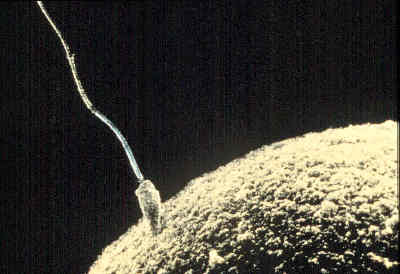Human development (biology)
Editor-In-Chief: C. Michael Gibson, M.S., M.D. [1]
Human development is the process of growing to maturity. In biological terms, this entails growth from a one-celled zygote to an adult human being.
Biological development

Development begins with fertilization, the process by which the male gamete, the sperm cell, and the female gamete, the oocyte, fuse to give rise to a diploid cell, the zygote. In pregnancy the 3 stages are commonly referred to as ZEF - meaning Zygote, Embryo, Fetus.
In medicine, pregnancy is defined as beginning when a fertilized zygote becomes implanted in a woman's uterus. This occurs when the zygote then becomes embedded into the endometrium (lining of the uterus) where it forms a placenta, for the purpose of receiving essential nutrients through the uterus wall. The umbilical cord in a newborn child signifies the remnants of implantation.
The zygote undergoes rapid mitotic divisions with no significant growth (a process known as cleavage) and cellular differentiation, leading to development of an embryo.
Childbirth is the process in which the baby is born. It is considered by many to be the beginning of a person's life, where age is defined relative to this event in most cultures.
Physical stages
Terms for stages of age-related physical development include, with their approximate age ranges:
- Life
- Prenatal (fertilisation - birth)
- Embryo - (fertilisation - 8 weeks of gestational phase)
- Zygote, the point of conception, fertilization
- blastocyst the period between conception and embryonic stages
- Embryo; the embryonic period starts at three weeks and continues until the end of the 8th week of pregnancy
- Foetus (8 weeks of gestational phase - birth)
- Embryo - (fertilisation - 8 weeks of gestational phase)
- Child (birth - age of majority)
- Neonate (newborn) (0-30 days)
- Infant (baby) (1 month-1 year)
- Toddler (1-4)
- Play age (3 - 6 years)
- Primary school age (also called prepubescence) (4-12)
- Elementary school age (also called middle childhood) (4-8)
- Preadolescence (preteen, or late childhood. The child in this and the previous phase are called schoolchild (schoolboy or schoolgirl), when still of primary school age.) (9-12)
- Adolescence and puberty (teenage) (13-19)
- Adult (20-death)
- Young adult (20-25)
- Early adulthood (20-39)
- Middle age (40-59)
- Advanced adult/Senior citizen (60+)
- Prenatal (fertilisation - birth)
- Death (occurs at various ages, depending on person)
- Decomposition (breakdown of the body after death)
Also sometimes used are terms that specify one's age in numbers, such as:
- Child (0-12)
- Teenager (13-19)
- Twentysomething (20-29)
- Thirtysomething (30-39)
- Fortysomething (40-49) (formerly also Quadragenarian, rarely used since 1980)
- Quinquagenarian (50-59)
- Sexagenarian (60-69)
- Septuagenarian (70-79)
- Octogenarian (80-89)
- Nonagenarian (90-99)
- Centenarian (100-109)
- Supercentenarian (110+)
Comparison table
| years[1] | ||
| Child | prenatal | >0 |
| infancy | 0 - walking | |
| toddlerhood | walking - 3 | |
| play age | 3-6 | |
| preadolescence | 10 - puberty | |
| adolescence | puberty - 19 | |
| Young adult | twentysomething | 20-29 |
| thirtysomething | 30-39 | |
| Middle age | fortysomething | 40-49 |
| quinquagenarian | 50-59 | |
| Advanced adult | sexagenarian | 60-69 |
| septuagenarian | 70-79 | |
| octogenarian | 80-89 | |
| nonagenarian | 90-99 | |
| centenarian | 100-109 | |
| supercentenarian | 110 |
Physical development milestones
- Ability to lift and control the orientation of the head
- Crawling begins
- Walking begins
- Speech begins
- Voice lowers in pitch (especially noticeable in boys)
- Pubic hair appears
- Genitals and reproductive organs mature
- Menses begin (females)
- Body hair and facial hair appears
Note: the Tanner stages can be used to approximately judge a child's age based on physical development.
See also
- Child development
- Developmental biology
- Auxology
- Embryogenesis
- Mammalian embryogenesis
- Life-history theory
Footnotes
- ↑ Approximately
Template:Embryology id:Tahap perkembangan manusia it:Sviluppo umano (biologia) nl:Levensfase
Template:WH Template:WS {{jb1}